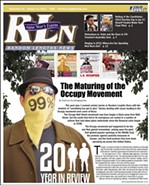Unchecked Powers
“The National Security Agency [NSA] eavesdropping scandal is not an isolated act
of lawbreaking. It is an outgrowth of an ideology of lawlessness that has been adopted by the Bush administration as its governing doctrine.”
That is half of the central thesis of How Would A Patriot Act? Defending American Values From A President Run Amok, by First Amendment lawyer and first-time author Glenn Greenwald, whose blog Unclaimed Territory has quickly become one of the hottest political sites online.
He goes on to say other such acts “include the incarceration in military prisons of U.S. citizens who were not charged with any crime or even allowed access to a lawyer, the use of legally prohibited torture techniques, and the establishment of a military detention center in Guantanamo Bay, a no-man’s-land that the administration claims is beyond the reach of U.S. law.”
The second half of his thesis is that this fear-based ideology of lawlessness has no place in America, and must be vigorously opposed by the American people in order to preserve our constitutional order based on separation of powers and the Bill of Rights.
Although mislabeled a liberal by Bush defenders, Greenwald is a non-partisan moderate who draws heavily on conservatives like Supreme Court Justice Antonin Scalia, former Congressmember Bob Barr, columnist George Will, and Heritage Foundation scholar Bruce Fein, employing liberals and Democrats in a decidedly secondary role. The introduction sketches out Greenwald’s own evolution from post-9/11 solid Bush supporter to merciless critic. The remainder of the book, a crisp 146 pages, retraces and contextualizes that path analytically, the political equivalent of a quality legal brief—spare, focused, mindful of facts, arguments, legal authorities... and the readers time.
The detention without trial or legal representation of U.S. citizens Yaser Hamdi and Jose Padilla as “enemy combatants” both ended in dropping the original accusations once Bush was forced to defend them in court—after years in isolated detention. Had they actually been guilty, Greenwald notes, there was no need to invent a new classification for them. They could simply have been charged with treason.
Hamdi, supposedly so dangerous he could not even be allowed a lawyer, was set free and allowed to settle in Saudi Arabia, with the proviso he renounce his citizenship—“[A] rather ironic action,” Greenwald notes, “given that Hamdi had, over the prior two years, been denied his basic citizenship rights.” Worse still, accusations against Padilla had been supported by “evidence” obtained under torture, as had “evidence” that Iraq had trained al Qaeda members to use biochemical weapons.
Indefinite detention, torture and the illegal NSA wiretapping all were justified by theories of unlimited Presidential power as “Commander-in-Chief,” beyond reach of Congress or the courts—theories that remained largely obscured until the NSA spying scandal drew them out into the open. Greenwald establishes these theories, drawing on the governments own statements, a task that seems to have eluded the mainstream media, until a couple of recent stories in the Boston Globe (one appeared early enough for Greenwald to cite). He then demolishes them, drawing on the Constitution, the Federalist Papers, recent court rulings, and the 1952 Youngstown case, in which the Supreme Court rejected similar—though less sweeping—assertions of unilateral power by Harry Truman.
Greenwald also snips away misleading and deceitful arguments used to defend Bush’s actions. For example, violations of FISA (the law governing the NSA wiretaps) began in October 2001, just when Bush was requesting—and getting—swift changes to the same law, changes he then claimed gave him everything he needed to keep Americans safe. Complaints about FISA’s “shortcomings” did not surface until after the administration was caught breaking the law.
With such flimsy rationalizations out of the way, Greenwald hones in one the central issue of unrestricted, dictatorial presidential power, and how thoroughly unconstitutional it is. But more: it is based on a deep hostility to the American political system.
In contrast to Bush’s claim he can do virtually anything as “commander in chief,” Greenwald quotes Scalia’s opinion in Hamdi vs. Rumsfeld: “Except for the actual command of military forces, all authorization for their maintenance and all explicit authorization for their use is placed in the control of Congress under Article I, rather than the President under Article II.” The authority Bush is claiming is unlimited—the very thing our Constitution was constructed to prevent.
Fortunately, Greenwald argues, it is not too late. Nixon seemed invulnerable long after Watergate first came to light. But once the public perceived him as responsible, his days were numbered. Despite a complacent Congress and media, citizen outrage can still prevail, he says. Whether it does remains in our hands.







